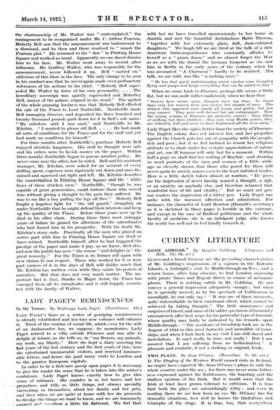LADY PAGET'S REMINISCENCES
In My Tower. By Walburga, Lady Paget. (Hutchinson. 42s.) LADY PAGET'S fame as a writer of gossiping reminiscences is already established find her •two new volumes will enhance it. Tired of the routine of social life, which even for the wife of an Ambassador has, we suppose, its monotonies, Lady Paget retired to a villa outside Florence and was able to delight at leisure, as she tells us, in "my flowers, my animals, my work, my liberty." Here she kept a diary covering the last years of the last century and the first years of this ; here she entertained innumerable visitors, and received hummer- able letters, and hence she paid many visits to London and
• to - the greater European capitals.
In order to be a first-rate gossip upon paper it is necessary to give the reader the sense that he is taken into the writer's confidence. Lady Paget knows exactly how to give this • sense of intimacy. She confides in us her tastes and her
- .. prejudices and tells us little things, not always specially interesting in themselves, about her family and her pets, and then when we are quite at home with her she proceeds to divulge the things we want to know, and we are immensely.
• amused Ise" vnr•►chow a little• bit flattered. We -feel that • with her we have travelled unconsciously to her home in Austria and met the beautiful Archduchess Marie Theresa, " together with her extremely plain, dull, dust-coloured daughters." We laugh till we are tired at the talk of a rich American train-acquaintance who constantly alludes to herself as a " green daam," and we almost forget the War as we see with the diarist the German Emperor as she saw him in Berlin in the early years of the century when he was accounted " A Charmeur " hardly to be resisted. His talk, we are told, was like " a rushing river."
" He has that. quick understanding which catches your thoughts flying and grasps and keeps everything that can be useful to him."
When we come back to Florence, perhaps life seems a little flat, but we can smile rather maliciously when we hear that
" Society here seems quite changed since my time. Tn those days very few women went into society but masses of men. The women who appeared were nearly all young and pretty, but not very correct. They were well dressed but not extravagant. Now the young women of Florence are perfectly correct they think of nothing but their children ; they only wear Worth gowns, they are infinitely dull and seem to have frightened all the men away."
Lady Paget likes the sights better than the society of Florence. The English colony does not interest her, and her prejudice against the Church puts her out of sympathy with the people, rich and poor ; but if we feel inclined to resent her religious attitude or to chafe under her ecstatic appreciations of nature and art, our ill humour will only last for a moment. Within half a page we shall find her writing of Mayfair—and showing us word portraits of the men and women of a little while ago so cleverly drawn that those who posed for them will never again be merely names even to the least initiated reader. Here is a little sketch taken almost at random, " Ile gives me the impression of never having wasted a thought, a sigh, or an anxiety on anybody else, and therefore retained that wonderful love of life and vitality." But we must not give our readers the impression of a bitter pen. Lady Paget can write with the warmest affection and admiration. For instance, the character of Lord Rowton (Disraeli's secretary) as it is sketched in these pages is lovable in the extreme, and except in the case of Radical politicians and the whole faculty of medicine, she is an indulgent judge who knows the world too well not to feel kindly towards it.














































 Previous page
Previous page